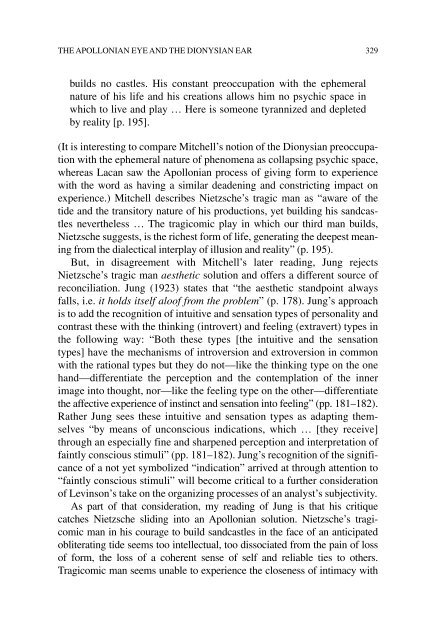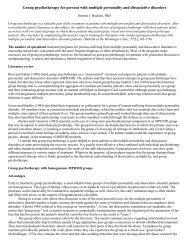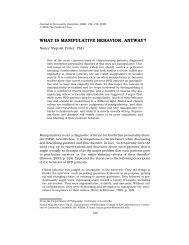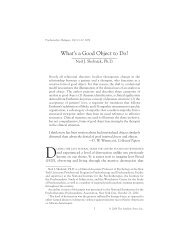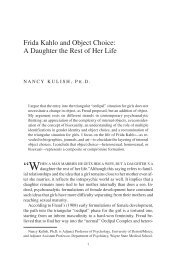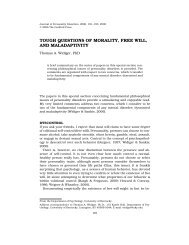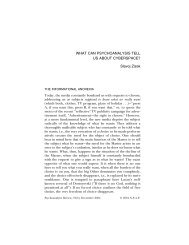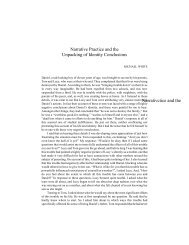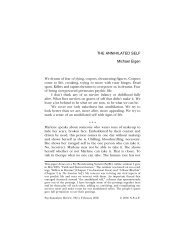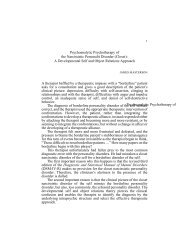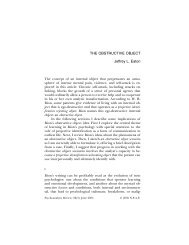The Apollonian Eye and the Dionysian Ear - PsyBC
The Apollonian Eye and the Dionysian Ear - PsyBC
The Apollonian Eye and the Dionysian Ear - PsyBC
You also want an ePaper? Increase the reach of your titles
YUMPU automatically turns print PDFs into web optimized ePapers that Google loves.
THE APOLLONIAN EYE AND THE DIONYSIAN EAR 329<br />
builds no castles. His constant preoccupation with <strong>the</strong> ephemeral<br />
nature of his life <strong>and</strong> his creations allows him no psychic space in<br />
which to live <strong>and</strong> play … Here is someone tyrannized <strong>and</strong> depleted<br />
by reality [p. 195].<br />
(It is interesting to compare Mitchell’s notion of <strong>the</strong> <strong>Dionysian</strong> preoccupation<br />
with <strong>the</strong> ephemeral nature of phenomena as collapsing psychic space,<br />
whereas Lacan saw <strong>the</strong> <strong>Apollonian</strong> process of giving form to experience<br />
with <strong>the</strong> word as having a similar deadening <strong>and</strong> constricting impact on<br />
experience.) Mitchell describes Nietzsche’s tragic man as “aware of <strong>the</strong><br />
tide <strong>and</strong> <strong>the</strong> transitory nature of his productions, yet building his s<strong>and</strong>castles<br />
never<strong>the</strong>less … <strong>The</strong> tragicomic play in which our third man builds,<br />
Nietzsche suggests, is <strong>the</strong> richest form of life, generating <strong>the</strong> deepest meaning<br />
from <strong>the</strong> dialectical interplay of illusion <strong>and</strong> reality” (p. 195).<br />
But, in disagreement with Mitchell’s later reading, Jung rejects<br />
Nietzsche’s tragic man aes<strong>the</strong>tic solution <strong>and</strong> offers a different source of<br />
reconciliation. Jung (1923) states that “<strong>the</strong> aes<strong>the</strong>tic st<strong>and</strong>point always<br />
falls, i.e. it holds itself aloof from <strong>the</strong> problem” (p. 178). Jung’s approach<br />
is to add <strong>the</strong> recognition of intuitive <strong>and</strong> sensation types of personality <strong>and</strong><br />
contrast <strong>the</strong>se with <strong>the</strong> thinking (introvert) <strong>and</strong> feeling (extravert) types in<br />
<strong>the</strong> following way: “Both <strong>the</strong>se types [<strong>the</strong> intuitive <strong>and</strong> <strong>the</strong> sensation<br />
types] have <strong>the</strong> mechanisms of introversion <strong>and</strong> extroversion in common<br />
with <strong>the</strong> rational types but <strong>the</strong>y do not—like <strong>the</strong> thinking type on <strong>the</strong> one<br />
h<strong>and</strong>—differentiate <strong>the</strong> perception <strong>and</strong> <strong>the</strong> contemplation of <strong>the</strong> inner<br />
image into thought, nor—like <strong>the</strong> feeling type on <strong>the</strong> o<strong>the</strong>r—differentiate<br />
<strong>the</strong> affective experience of instinct <strong>and</strong> sensation into feeling” (pp. 181–182).<br />
Ra<strong>the</strong>r Jung sees <strong>the</strong>se intuitive <strong>and</strong> sensation types as adapting <strong>the</strong>mselves<br />
“by means of unconscious indications, which … [<strong>the</strong>y receive]<br />
through an especially fine <strong>and</strong> sharpened perception <strong>and</strong> interpretation of<br />
faintly conscious stimuli” (pp. 181–182). Jung’s recognition of <strong>the</strong> significance<br />
of a not yet symbolized “indication” arrived at through attention to<br />
“faintly conscious stimuli” will become critical to a fur<strong>the</strong>r consideration<br />
of Levinson’s take on <strong>the</strong> organizing processes of an analyst’s subjectivity.<br />
As part of that consideration, my reading of Jung is that his critique<br />
catches Nietzsche sliding into an <strong>Apollonian</strong> solution. Nietzsche’s tragicomic<br />
man in his courage to build s<strong>and</strong>castles in <strong>the</strong> face of an anticipated<br />
obliterating tide seems too intellectual, too dissociated from <strong>the</strong> pain of loss<br />
of form, <strong>the</strong> loss of a coherent sense of self <strong>and</strong> reliable ties to o<strong>the</strong>rs.<br />
Tragicomic man seems unable to experience <strong>the</strong> closeness of intimacy with


